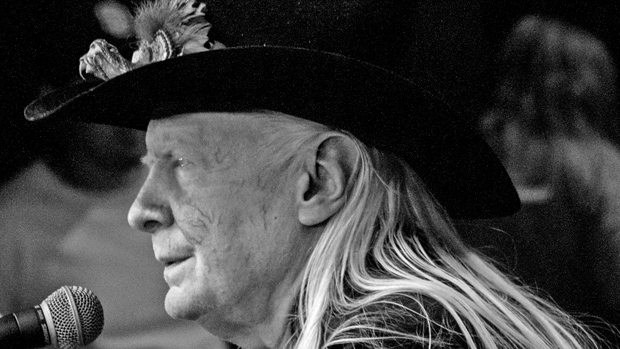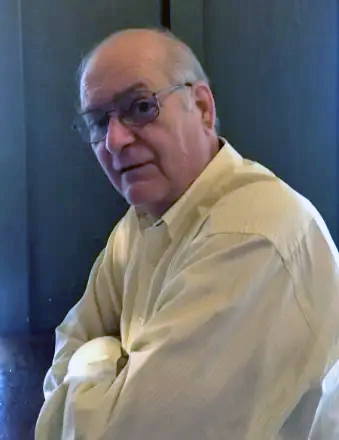
On the evening of Wednesday, July 16, Amberly Stokes received a dire text message while tending bar at Rosa’s Lounge, a blues club in the Logan Square neighborhood of Chicago.
Stokes, a young, unsung hero of the blues, relayed the info to the man on stage, harmonica great Sugar Blue, best known for blowing harp on the Rolling Stones’ 1978 smash, “Miss You.”
Blue—born James Whiting in Harlem in 1949—announced the as-yet-unconfirmed report from the stage.
And club owner and drummer Tony Mangiullo, in his office on the second floor of the juke named for his mother, heard it through the floorboards.
The great blues guitarist Johnny Winter was dead.
“Boom—gone!” said Mangiullo, standing outside of the West Armitage Avenue club a few days after Winter, 70, died on tour in Switzerland. “When I was growing up back in Milan, Johnny was part of my introduction to the blues.”
Around the world, a million middle-aged music fans—people like me, a 56-year-old who came of age when blues/rock bands like Foghat sold out baseball stadiums—were saying the same thing.
I’d heard “I Can’t Quit You Baby” on the first Zeppelin album in high school with no idea who Willie Dixon was and was walloped by Johnny’s sonic take on “Rock Me Baby”—without knowing it was one of the most covered blues compositions of all-time—on the Still Alive & Well LP.
But my true introduction to the blues didn’t happen until Johnny began working in the late 1970s with Muddy Waters, who once told me that “Johnny Winter is the only white man who really understands the blues.”
 So obsessed did I become with the music of Mississippi filtered through the field hollering voice and long, bony fingers of a man whose paternal grandfather was once the mayor of Leland—“you know, that’s where I come from …” he sang—that I once advocated the Gospel According to Johnny to Pete Townsend of The Who.
So obsessed did I become with the music of Mississippi filtered through the field hollering voice and long, bony fingers of a man whose paternal grandfather was once the mayor of Leland—“you know, that’s where I come from …” he sang—that I once advocated the Gospel According to Johnny to Pete Townsend of The Who.
It was the summer of 1997 and Johnny was well into a long medical and musical decline—methadone and carpal tunnel, weak of voice and wizened beyond his years by booze and cigarettes—a predicament only somewhat rectified just before his death.
Strolling down Portobello Road in London, I spied Townsend walking by himself and ran up to thank him for giving me so much joy over so many years, especially Quadrophenia.
I then asked a question that will forever burn in my heart.
“Don’t you think that Johnny Winter is the far superior blues guitarist than Eric Clapton?”
Townsend just stared at me and our brief and up-to-then amiable chat soon ended. It was Johnny’s suffering that prompted the sincere though ridiculous question; an American brick through the window of the Rock Aristocracy to which Winter once belonged.
Because the truth is—in addition to the drugs and booze and his manifold insecurities—Johnny’s once mighty career deteriorated because of his stubborn commitment to the only music he loved.
The fans screamed for rock and roll and he gave them gasoline.
In a recent appreciation of Johnny Winter, Washington, D.C. music critic Geoffrey Himes told this story by-way-of Austin writer Michael Corcoran.
Not long before Rolling Stone magazine “discovered” him in 1968, Johnny and his power trio—drummer “Uncle John” Turner and bassist Tommy Shannon—opened for Muddy Waters at the fabled Vulcan Gas Company in Austin, Texas.
It was the elder bluesman’s first encounter with Winter and he was astonished as this skinny kid roared through a set that included “Rollin’ and Tumblin’” which the Rolling Fork-born Waters first recorded in 1950.
Dropping nickels into a pay phone to call a friend back in Chicago; Muddy held the receiver in the air for a few moments and then got back on the horn.
“He’s white!’ Muddy shouted into the phone. “He’s REALLY white!”
–
This article originally appeared in The Local Voice #209 (published July 31, 2014). To download a PDF of this issue, click here.
–
by Rafael Alvarez
www.alvarezfiction.com




